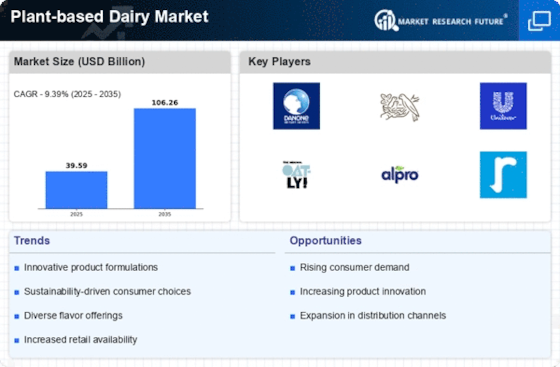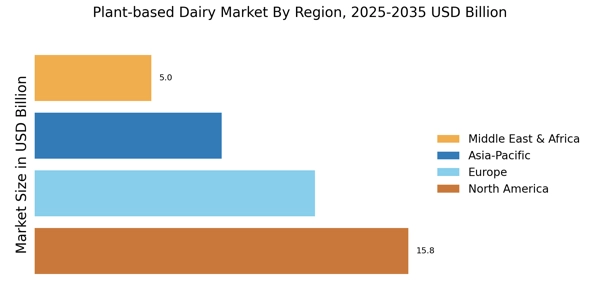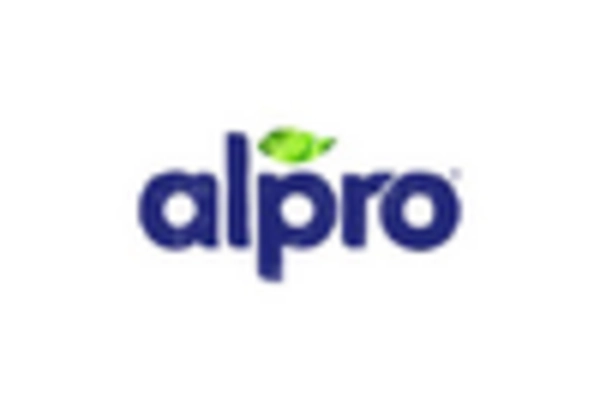Innovation in Product Development
Innovation in product development is a crucial driver for the Plant-based Dairy Market. Companies are increasingly investing in research and development to create new and improved plant-based dairy products that cater to diverse consumer preferences. This includes the introduction of products that mimic the taste and texture of traditional dairy, such as plant-based cheeses and yogurts. In 2025, the market is expected to witness a surge in innovative offerings, with a projected increase in product launches by approximately 15%. This focus on innovation not only enhances consumer choice but also positions the Plant-based Dairy Market as a dynamic sector capable of adapting to changing consumer demands.
Health Consciousness Driving Demand
The increasing awareness of health and wellness among consumers appears to be a primary driver for the Plant-based Dairy Market. As individuals become more informed about the nutritional benefits of plant-based alternatives, the demand for these products continues to rise. Research indicates that plant-based dairy products are often lower in saturated fats and cholesterol, appealing to health-conscious consumers. In 2025, the market for plant-based dairy is projected to reach approximately 30 billion dollars, reflecting a significant shift in consumer preferences. This trend suggests that the Plant-based Dairy Market is likely to expand as more people seek healthier dietary options, potentially leading to a broader range of products and innovations in the sector.
Rising Vegan and Vegetarian Populations
The rising populations of vegans and vegetarians are significantly impacting the Plant-based Dairy Market. As more individuals adopt plant-based diets for health, ethical, or environmental reasons, the demand for plant-based dairy alternatives is likely to increase. Recent surveys indicate that approximately 10% of the population identifies as vegan, with an additional 30% considering themselves vegetarian. This demographic shift suggests a growing market for plant-based dairy products, as these consumers seek alternatives to traditional dairy. The Plant-based Dairy Market is poised to benefit from this trend, potentially leading to increased market penetration and product diversification to meet the needs of this expanding consumer base.
Increased Availability and Accessibility
Increased availability and accessibility of plant-based dairy products are driving growth in the Plant-based Dairy Market. Retailers are expanding their offerings to include a wider range of plant-based alternatives, making these products more accessible to consumers. This trend is supported by the rise of e-commerce platforms, which facilitate the purchase of plant-based dairy products from the comfort of home. In 2025, it is anticipated that the number of retail outlets carrying plant-based dairy will increase by approximately 20%, reflecting a growing recognition of consumer demand. This enhanced accessibility is likely to contribute to the overall growth of the Plant-based Dairy Market, as more consumers are encouraged to try these alternatives.
Sustainability and Ethical Considerations
Sustainability concerns and ethical considerations are increasingly influencing consumer choices, thereby driving the Plant-based Dairy Market. Many consumers are becoming more aware of the environmental impact of traditional dairy farming, including greenhouse gas emissions and land use. As a result, there is a growing preference for plant-based alternatives that are perceived as more sustainable. The Plant-based Dairy Market is responding to this demand by emphasizing eco-friendly practices and sourcing. In 2025, it is estimated that the market will see a compound annual growth rate of around 10%, indicating a robust shift towards sustainable consumption patterns. This trend suggests that the Plant-based Dairy Market may continue to thrive as consumers prioritize ethical and environmentally friendly products.


















